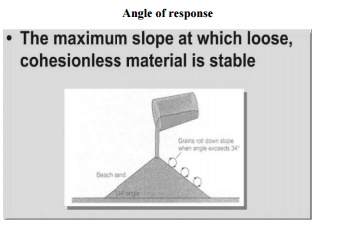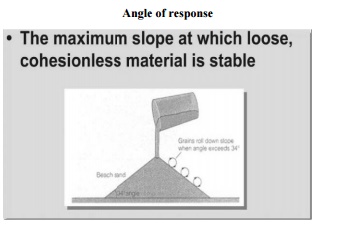Chapter: Civil : Soil Mechanics -Stress Distribution And Settlement
Soil Mechanics: Cohesion and Stresses

Cohesion:
it is the force of attractioon
between the particles binding them togeth er. cohesion is present in clays and
silts but is n ormally absent in sands and gravels.Cohesio n (C), is a measure
of the forces that cement particles of soils
Angle of Repose determ ined by:

·
Particle size (hig her for large particles)
·
Particle shape (higher for angular shapes)
·
Shear strength (h igher for higher shear strength)
Stresses:
Gravity generates stresses (force per unit area) in the ground
at different points. Stress on a plane at a given point is viewed in terms of
two components:
1 Normal stress (?): acts
normal to the plane and tend s to compress soil grains towards each oth
er (volume change)
2Shear stress (?): a
cts tangential to the plane and tends to slide grains relative to each other
(distortion and ulti mately sliding failure)
3Factors Influenci ng Shear
Strength:
The
shearing strength is affected by:
· Soil composition: mineralogy, grain size and grain size distribution, shape of particles, pore fl uid type and content, ions on grain and in pore fluid.
·
Initial state: State
can be describe by terms such as: loose, dense, over-consolidated, no rmally
consolidated, stiff, soft, etc.
·
Structure: Refers
to the arrangement of particles within the soil mass; the manner
in whic h the particles are packed or distributed. Feaatures such as layers,
voids, pockets, cementation, etc, are part of the structure.
4 Formulation of Shear Strength of Soil:
·
In reality, a com plete shear strength formulation
would acco unt for all previously stated factors.
Soil behavior is quite complex due to the possible
variables s tated.
Related Topics